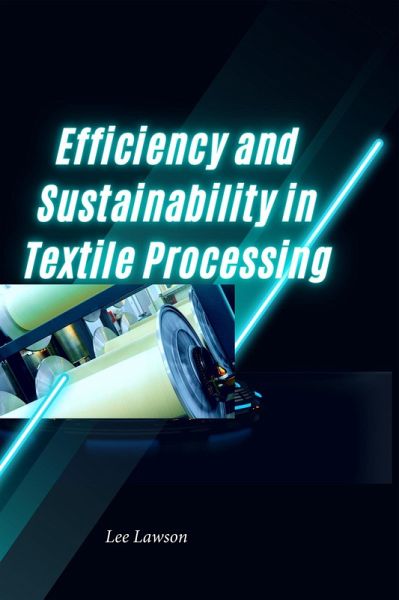
Efficiency and Sustainability in Textile Processing (eBook, ePUB)

PAYBACK Punkte
0 °P sammeln!
In the textile industry, there is a growing need for sustainable and efficient production processes that minimize waste and reduce environmental impact. In "Efficiency and Sustainability in Textile Processing," author Lee Lawson presents a comprehensive guide to achieving sustainability and efficiency in textile processing.The book provides an overview of the environmental impacts of textile processing and the importance of sustainable practices. It then delves into the specifics of implementing efficient and sustainable processes, such as water conservation, energy efficiency, and cleaner pro...
In the textile industry, there is a growing need for sustainable and efficient production processes that minimize waste and reduce environmental impact. In "Efficiency and Sustainability in Textile Processing," author Lee Lawson presents a comprehensive guide to achieving sustainability and efficiency in textile processing.
The book provides an overview of the environmental impacts of textile processing and the importance of sustainable practices. It then delves into the specifics of implementing efficient and sustainable processes, such as water conservation, energy efficiency, and cleaner production.
Udhayamarthandan provides practical guidance on implementing sustainable practices in textile processing, including process optimization, waste reduction, and the use of renewable energy sources. The book also covers emerging technologies and best practices for sustainable textile production, such as digital printing, biodegradable fibers, and circular economy concepts.
Throughout the book, Udhayamarthandan emphasizes the importance of collaboration and stakeholder engagement in achieving sustainable textile production. The book includes case studies and examples of successful sustainable textile production initiatives, providing readers with valuable insights into practical implementation.
This book is an essential resource for textile industry professionals, sustainability practitioners, and anyone interested in promoting sustainable and efficient textile processing. It provides a roadmap for achieving sustainability and efficiency in textile processing, helping to minimize the industry's impact on the environment while maintaining high-quality production standards.
The book provides an overview of the environmental impacts of textile processing and the importance of sustainable practices. It then delves into the specifics of implementing efficient and sustainable processes, such as water conservation, energy efficiency, and cleaner production.
Udhayamarthandan provides practical guidance on implementing sustainable practices in textile processing, including process optimization, waste reduction, and the use of renewable energy sources. The book also covers emerging technologies and best practices for sustainable textile production, such as digital printing, biodegradable fibers, and circular economy concepts.
Throughout the book, Udhayamarthandan emphasizes the importance of collaboration and stakeholder engagement in achieving sustainable textile production. The book includes case studies and examples of successful sustainable textile production initiatives, providing readers with valuable insights into practical implementation.
This book is an essential resource for textile industry professionals, sustainability practitioners, and anyone interested in promoting sustainable and efficient textile processing. It provides a roadmap for achieving sustainability and efficiency in textile processing, helping to minimize the industry's impact on the environment while maintaining high-quality production standards.
Dieser Download kann aus rechtlichen Gründen nur mit Rechnungsadresse in A, B, CY, CZ, D, DK, EW, E, FIN, F, GR, H, IRL, I, LT, L, LR, M, NL, PL, P, R, S, SLO, SK ausgeliefert werden.













